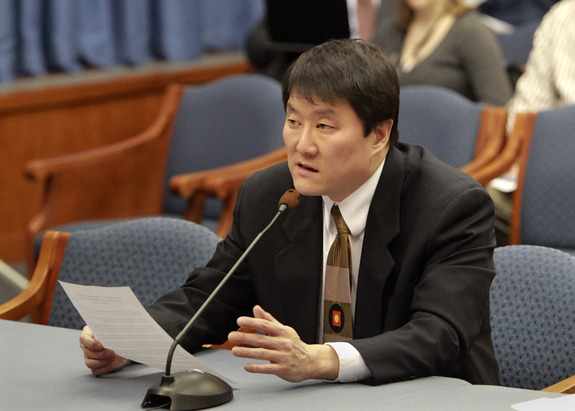State senator’s plan would burn DPS debt with tobacco revenue
LANSING – A Detroit-area state senator said he is working on legislation that could use tobacco revenue as a funding source to tackle Detroit Public Schools’ massive operating debt, similar to a budget proposal Gov. Rick Snyder introduced last week.
Sen. Hoon-Yung Hopgood, D-Taylor, said he initially considered using state tobacco tax revenue in a bill he is drafting to pay for an overhaul of the district that would split it in two to pay an estimated $515 million in debt.
But Hopgood said he is open to the idea of drawing money from Michigan’s share of a national tobacco settlement after Snyder proposed using $72 million a year for a decade to reform the struggling district.
“I think we’re onto the right path as far as that’s concerned,” Hopgood said, adding that the bill could be introduced as part of a broader DPS reform package.
Lawmakers appear to agree that urgent action is necessary if Detroit’s school system is to avoid defaulting on debt. Projections indicate the district will run out of cash by spring.
There has been no consensus on how to pay for it. Although Snyder has identified a funding source in his 2017 budget, he’ll still have to convince lawmakers.
“All of us agree that the financial piece has to get taken care of,” said Rep. Al Pscholka, R-Stevensville, chairman of the House appropriations committee.
Yet “there might be a better solution” than tobacco money, said Pscholka, adding that he is considering a way to fund the DPS fix without school or general fund money.
He would not offer details, saying he is still discussing ideas with Snyder.
Money running out
Since Snyder outlined the details of his reform plan last fall, he has faced pushback from Detroit lawmakers over local control and from outstate legislators concerned about using School Aid Fund dollars for Detroit at the expense of other districts.
He wants the legislature to adopt bills by this summer to address the district’s finances. Snyder has been careful not to say DPS could file for bankruptcy, but said if a creditor decides to take the district to court, a judge’s decision could yield more expensive consequences.
Most of the district’s debt is owed to the state, backed by the state or tied up in pensions, state Treasurer Nick Khouri said in a presentation last week to a Senate committee.
DPS pays about $50 million a year in debt service.
Its $515 million in debt has accumulated from long-term bonds, short-term borrowing to improve cash flow, unpaid payments into the state pension system and late payments to vendors, Khouri said.
“Bankruptcy is a terrible option for the district,” he wrote. “The bankruptcy process is always uncertain, but in the end, it will cost the state more than double the cost of the proposed legislation.”
Bankruptcy could disrupt the district for eight months to a year and cost $75 million to $100 million in fees, he wrote.
Snyder’s plan would use $720 million over 10 years from the state’s tobacco settlement to pay for the plan, which would split DPS into two districts. The existing district would be phased out once its debt is repaid, while a new Detroit Community School District would be created to educate the city’s roughly 47,000 students. He estimates the new district would need $200 million in startup funding.
DPS would continue to collect a local operating millage for debt repayment, while the new district would receive $72 million in annual payments from the state’s School Aid Fund as its operating funds. The tobacco money would reimburse the school fund to avoid cuts to other Michigan schools.
“So (lawmakers) can go tell their school districts, the parents in those school districts, that this money is not at the expense of money that would otherwise go to their school district,” Snyder told reporters last week.
Tobacco settlement particulars
Michigan, 45 other states and Washington, D.C., reached a settlement in 1998 with tobacco manufacturers that is due to drop roughly $284 million into the state’s general fund next year. About $193 million will remain after some restricted funds are taken off the top, state budget spokesman Kurt Weiss said.
More than $23 million of the tobacco funds earmarked for Detroit schools in a new Detroit Public Schools trust fund, however, is budgeted for some Medicaid programs in 2017, according to a House Fiscal Agency analysis. The remaining $49 million is available next year as one-time funds.
By 2018, Detroit would require about $47 million in tobacco funds from Medicaid, with the rest coming from a projected rise in the amount paid by tobacco manufacturers, according to the analysis.
Another $50 million is proposed for DPS in a budget amendment in the current fiscal year to support short-term daily operations.
Questions about how the new district would be governed – including the makeup of its board and creation of a proposed Detroit Education Commission, with oversight of city public and charter schools – have not been resolved.
See what new members are saying about why they donated to Bridge Michigan:
- “In order for this information to be accurate and unbiased it must be underwritten by its readers, not by special interests.” - Larry S.
- “Not many other media sources report on the topics Bridge does.” - Susan B.
- “Your journalism is outstanding and rare these days.” - Mark S.
If you want to ensure the future of nonpartisan, nonprofit Michigan journalism, please become a member today. You, too, will be asked why you donated and maybe we'll feature your quote next time!


 Sen. Hoon-Yung Hopgood, D-Taylor, wants to use tobacco revenue to partially address Detroit Public Schools’ $515 million debt.
Sen. Hoon-Yung Hopgood, D-Taylor, wants to use tobacco revenue to partially address Detroit Public Schools’ $515 million debt.